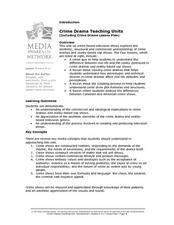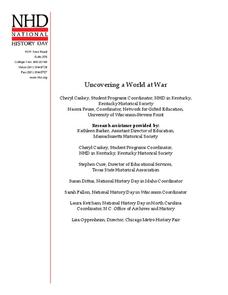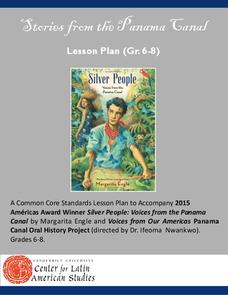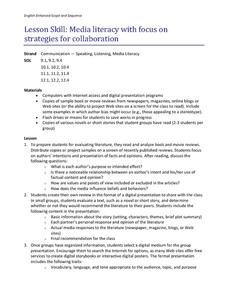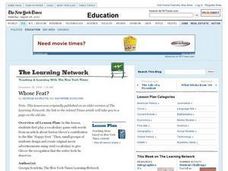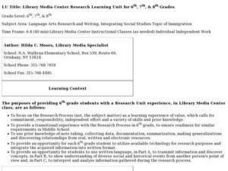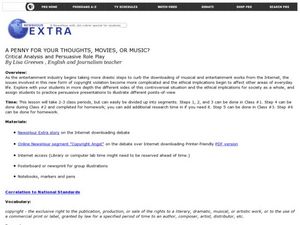Media Smarts
Bias in News Sources
As young consumers of media, it is important for high schoolers to explore concepts of bias and prejudice, and how they may be present in media. After discussing ideological messages that media can contain, individuals complete a warm-up...
Museum of Tolerance
Developing Media Literacy
To protect young people from questionable content, many schools limit access. This resource suggests that because learners can so readily avail themselves to unrestricted Internet access, it is vital for 21st century...
Library of Congress
Determining Point of View: Paul Revere and the Boston Massacre
If you're teaching point of view, this is the lesson for you! First, decipher the writer's point of view from a primary resource, then compare and contrast the primary source with a secondary source to explore the Paul Revere's...
Prestwick House
Understanding Language: Slant, Spin, and Bias in the News
We live in a time of fake news, alternative realities, and media bias. What could be more timely than an activity that asks class members to research how different sources report the same topic in the news?
Curated OER
Children's Media and Censorship
High schoolers form opinions about children and television censorship after analyzing literature. They complete a journal writing activity to identify the topic and make a list of inappropriate television shows for children. Next, they...
J. Paul Getty Trust
Exhibiting Common Threads
Artists working in different media often explore the same themes—to model how these same themes weave their way through different forms of artistic expression, scholars analyze images by Dorothea Lange, identifying key themes in her...
Curated OER
Dissecting the Media
Students examine an editorial point of view in journalism and explore how this contributes to the West's understanding of events in the Middle East. They discuss the concepts of objectivity and subjectivity, and how tone and vocabulary,...
Curated OER
Crime Drama Teaching Units
Investigate the nature of crime dramas on television. What exactly are they trying to portray? Questions and a comparison chart support learners as they watch shows from Canada, Great Britain, and the United States. An oral presentation...
National History Day
Uncovering a World at War
Has media always had an influence on public policy? After researching and reading news articles written during World War I, learners understand the influence of communication and media. They discuss articles in small groups and as a...
Curated OER
Things Aren't Always What They Seem
Students use video and the Internet to make predictions, draw conclusions, determine conflict and point of view while reading a short story. In this short story analysis lesson, students watch a related video and complete a prediction...
Vanderbilt University
Stories from the Panama Canal
The stories of the Silver People, the West Indies immigrants hired to work on the Panama Canal, come to life in a lesson plan about the building of the Panama Canal. Groups research why the canal was built, how it was build, the working...
English Enhanced Scope and Sequence
Media Literacy with Focus of Strategies for Collaboration
Introduce your class to literary analysis with a series of activities that has them examine book and movie reviews. Groups then draft their own review of a text, select a digital medium, and craft a presentation.
Curated OER
Quality of Information: Point of View and Bias
Fifth graders identify stereotypes of Indian people based on perceived characteristics. They discuss the misconceptions. Students define quality of information and give an example from the story "Seaman's Journal: On The Trail With Lewis...
Curated OER
Whose Feat?
Play a vocabulary game with words from an article about Savion Glover's contribution to the film "Happy Feet." Then, small groups of students design and create original movie advertisements using vivid vocabulary to give Glover the...
Curated OER
Library Media Center Research Learning Unit for 6th, 7th, & 8th Grades
Middle schoolers focus on the process of and skills necessary for researching a topic. They study the topic of immigration while practicing note taking skills, organizing information and writing conventions.
Media Education Lab
Propaganda in Context
"Board Game Helps Fight Real World Ebola," a video produced by Voice of America, provides the text for a guided instructional activity that asks viewers to analyze the propaganda techniques used in the video. Groups then select a example...
National Endowment for the Humanities
Chronicling America: Uncovering a World at War
As part of a study of World War I, class members read newspaper articles from the time that urge American involvement, non-involvement, or neutrality. Using the provided worksheet, groups analyze the articles noting the central argument...
Curated OER
A Penny for Your Thoughts, Movies, or Music?
Young scholars investigate copyright violation laws. In this media copyright lesson, students read two articles that discuss copyright laws, then they develop their own perspective on the laws. Young scholars then divide into...
Curated OER
The Colonization of the United States
Bring the Age of Exploration into the 21st century with this ancestry activity! Learners get a chance to explore the complex genealogy of the Spanish settlers through watching two video clips (approximately five minutes each) featuring...
Curated OER
Library Treasure Hunt
Pupils conduct a scavenger hunt activity in their library. For this library research lesson, students use treasure hunt worksheets to locate various items on the library computers and in the library shelves.
Curated OER
Caldecott Medal Winners
Second graders identify Caldecott Medal winners. In this library media lesson, 2nd graders view an overhead transparency of Caldecott Medal winners from 1987-2004 and answer questions based on the data that is displayed.
Curated OER
Will the Real Ben Franklin Please Stand Up?
Learners explore the life of Benjamin Franklin. In this American history instructional activity, students research primary and secondary documents regarding Franklin's life. Learners should examine the point of view each of the accounts...
Curated OER
Dream Streets
Sixth graders conduct research on the internet to discover the principles of drawing using one and two point perspectives. After examining street scenes by Edward Hopper and postcards of Main Street USA in Disney, they write about and...
Curated OER
Introduction To Literary Analysis
Explore the fascinating ways in which authors use specific literary devices to create interesting and realistic texts. Using non-fiction articles with the subject of rogue waves, an excerpt from The Perfect Storm, by Sebastian Junger,...







